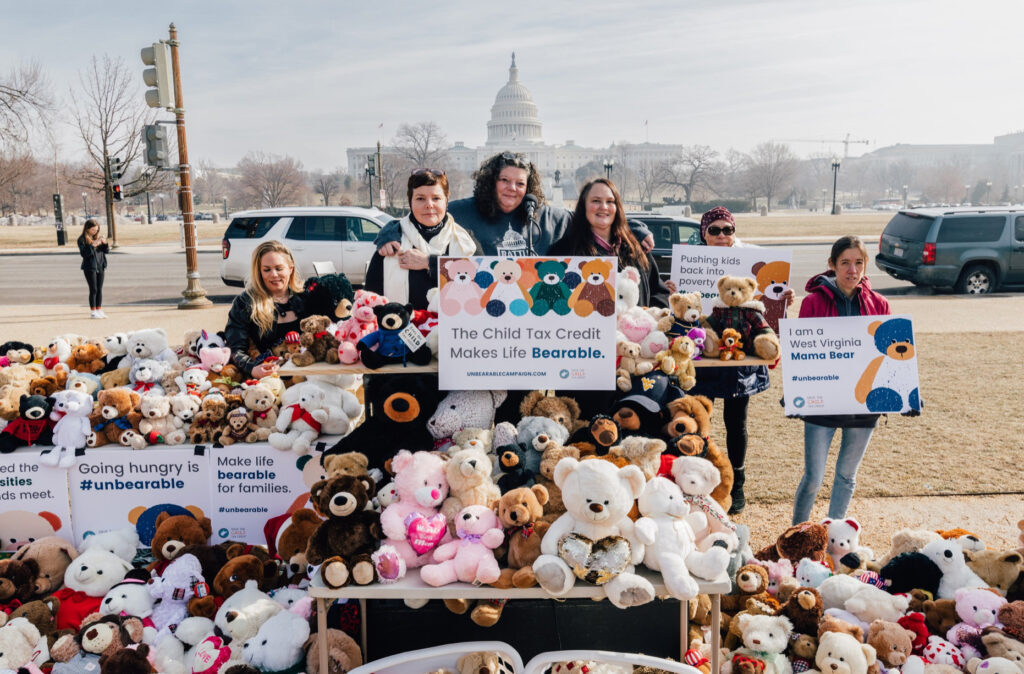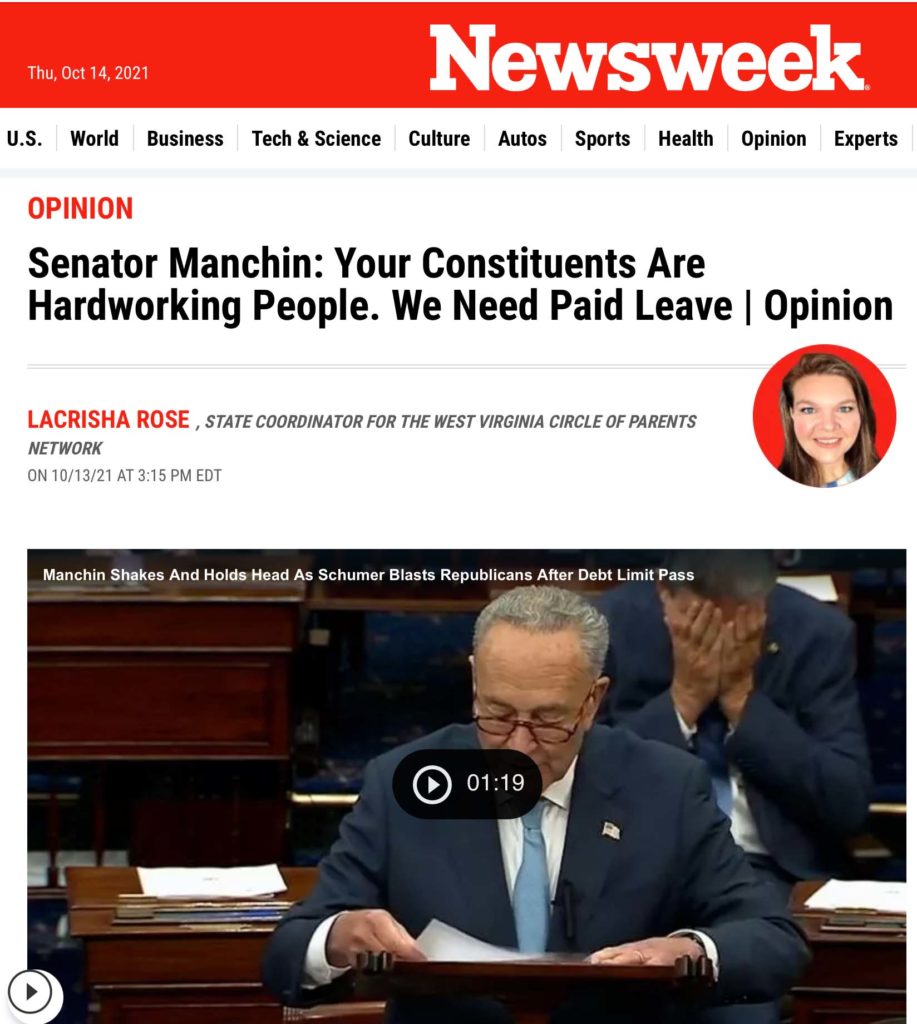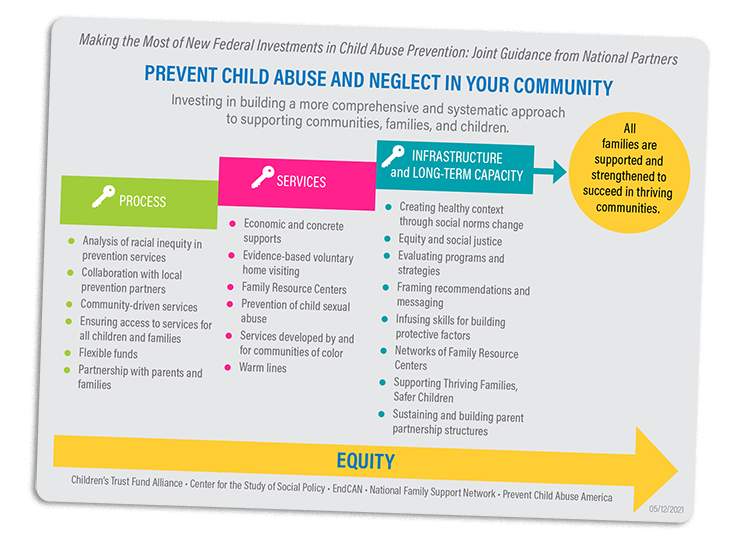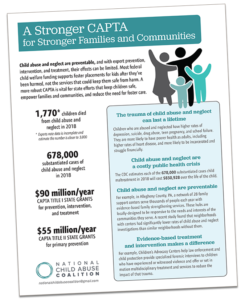Public Policy
ON THIS PAGE: ONGOING POLICY WORK | COVID-19 RESPONSES | PUBLIC POLICY FRAMEWORK | CAPTA | FFPSA
Our policy work is proactive and focused on proposing and supporting policies that promote health and well-being and prevent child maltreatment.
Policy Framework and 2023-2024 Policy Agenda
To accomplish its mission the Alliance takes an active role in the public policy arena to advance policies and legislation that:
- Bolster the strength and influence of state children’s trust and prevention funds,
- Help build conditions where all families thrive and children grow up free from child maltreatment, and
- Promote and support a system of services, laws, practices and attitudes that supports families by enabling them to provide their children with safe, healthy and nurturing childhoods.
The Alliance’s policy work is proactive and focused on proposing and supporting policies that promote health and well-being and prevent child maltreatment.
Alliance Policy Framework
Issues will be endorsed or opposed based on their alignment with the approved Policy Agenda and their potential to advance or undermine the work of the Alliance. Endorsement does not imply endorsement by individual Alliance members. In making this determination the Alliance will consider to what extent:
- The policy aligns with following policy strategies identified by the Centers for Disease Control and Prevention in their Technical Assistance Package for Preventing Child Abuse and Neglect
- The policy promotes or undermines the Strengthening Families Protective Factors identified by the Center for the Study of Social Policy[3] and put into practice through the work of the Alliance and our partners to promote positive outcomes for children and families including reductions in child maltreatment. The Strengthening Families Protective Factors are:
- The policy advances racial justice and equity. Specifically, whether the policy aligns with our commitment to amplify voices of those who have been marginalized and promotes equity and justice including support for policies that address the root causes of racial inequality, as well as policies to end discriminatory family policing practices.
- The policy aligns with the Alliance’s Theory of Change
Children’s Trust Fund Alliance Policy Priorities
High Priority Issues
- Increased appropriations for CBCAP
- Introduction and passage of stand-alone bill for Title II of CAPTA / CBCAP
- Child Abuse Prevention & Treatment Act (CAPTA) Reauthorization as recommended by Senate HELP Committee in 2022
- Title IV-B reauthorization including Stephanie Tubbs Jones Child Welfare Services (CWS) program and Promoting Safe and Stable Families (PSSF) program including Increased funding for prevention and family support via Title IV-B
- Increased funding for Peer Support Programs in child welfare
- Enact policies to expand supports for families, decrease surveillance of families by mandated reporters, and reduce unwarranted calls to CPS
Issues We Support/Endorse
- Revisions to Family First Prevention Services Act to expand support for family support services and use of Title IV-E prevention funds for economic supports for families
- Improved policies to strengthen connections between birth parents and foster/resource parents
- Passage of the Family Poverty is Not Child Neglect Act that would make clear that child welfare agencies should not separate children from their parents solely due to poverty
- Bolster requirements for active efforts – not just reasonable efforts prior to placing a child out of home
- Passage of RISE from Trauma Act which funds communities to take action to reduce child trauma and help children and their families exposed to violence and experiencing abuse and addiction
- Passage of SUPPORT for Patients and Communities Reauthorization Act to continue efforts to address the nation’s opioid and mental health crises with amendments to support reforms to Plans of Safe Care
- Passage of Preventing Adverse Childhood Experiences (PACE) Act (pending introduction)
- Increased appropriations for children and family programs
- Legislation to strengthen economic and concrete supports for families (citation)
Level of Endorsement
The following levels of involvement will be used to guide the Alliance’s policy activities:
High Priority: Means the Alliance has defined the policy issue as part of its primary policy agenda. The Alliance will develop a formal position and devote staff and contractual time to promote the policy issues as part of its own policy agenda. Efforts may include developing proposed legislation or a solution, preparing educational materials, informing constituents via personal, written and electronic means and mobilizing support for the policy at the grassroots, organizational, administrative and legislative levels.
Support / Endorse: Means the Alliance will monitor the policy issue and track the issue in collaboration with other public policy partners including, but not limited to, these coalitions in which we are formal members: the National Child Abuse Coalition (NCAC), the National Home Visiting Coalition and the National Coalition to Prevent Child Sexual Abuse and Exploitation. Upon request, the Alliance will distribute information about such policy issues via electronic means to our membership.
Monitor: Means the Alliance will monitor the policy issue and track the issue in collaboration with other public policy partners including, but not limited to, these coalitions in which we are formal members: the National Child Abuse Coalition (NCAC), the National Home Visiting Coalition and the National Coalition to Prevent Child Sexual Abuse and Exploitation.
Resist / Object: Includes monitoring of issues and proposals that undermine the mission and the strategic plan of the Alliance. The Alliance will express its opposition to the policy issue. Upon request of partnering organizations, the Alliance will distribute information about such policy issues via electronic means to our membership.
Oppose: Means the Alliance has determined the policy issue or proposal will likely undermine the mission and the strategic plan of the Alliance. The Alliance will develop a formal position and devote staff and contractual time to opposing the policy issue as part of its own policy agenda. Opposition may include developing alternative legislation or an alternate solution, preparing educational materials, informing constituents via personal, written and electronic means and mobilizing opposition for the policy at the grassroots, organizational, administrative, and legislative levels.
SIGN UP
Alliance Action Alert List
To receive Alliance news, updates and action alerts delivered to your inbox just sign up HERE.
For More Information
Jim McKay
Public Policy Director
Children’s Trust Fund Alliance
jim.mckay@ctfalliance.org
Ongoing Public Policy Work
ALL Children and Their Families Deserve Our Support
The Alliance issued a statement in March relating to Texas Governor Greg Abbott’s effort to classify gender affirming care for transgender children as child abuse. In its statement, the Alliance points out that research and national experts say “gender affirming care is NOT child abuse.” The Alliance stands with colleagues across the nation in opposing such actions, and says, “Parents of transgender children need to be supported – not reported.” These parents are demonstrating unconditional love for their child. These parents are telling their children, “I accept you for who you are as a person regardless of gender identity.” This is not a decision taken lightly, knowing the stigma and hardship their children are likely to experience as a result of bias and discrimination.
The Alliance’s statement is available to download:
Stand with the Mama Bears Today to Make Life Bearable for Families
 On February 2, 2022 a group of West Virginian Moms shared their stories in front of 500+ teddy bears at the US Capitol. Calling themselves the West Virginia Mama Bears, they reminded the nation that the elimination of the enhanced Child Tax Credit (CTC) had and continues to have real and damaging consequences for 50,000 children in West Virginia.
On February 2, 2022 a group of West Virginian Moms shared their stories in front of 500+ teddy bears at the US Capitol. Calling themselves the West Virginia Mama Bears, they reminded the nation that the elimination of the enhanced Child Tax Credit (CTC) had and continues to have real and damaging consequences for 50,000 children in West Virginia.
“Each of these bears represents 100 children,” Amy Jo Hutchison, a Wheeling mother and organizer of the event, said during a brief rally with a half-dozen other “Mama Bears” who had made the trip to Washington. “Together these 500 bears represent the 50,000 West Virginia kiddos who have been pushed back into poverty since the halt of the child tax credit payments.”
While this grassroots campaign started with a group of moms, several state organizations, including the West Virginia Children’s Trust Fund, formed a coalition to help elevate the lives and needs of children.
The West Virginia movement began with Amy Jo doing a Facebook live video. She said, “I’m calling on mama bears from all over West Virginia to come together and support the CHILD in the child tax credit. This is unbearable.” A Twitter account with Teddy the West Virginia black bear was launched. Eventually, it all culminated with the Feb. 2 event in Washington, DC, a website and a call for national solidarity.
To stand with the Mama Bears and make life more bearable for kids, visit unbearablecampaign.com to see photos and read stories from real families speaking out. Access the Unbearable Campaign Toolkit and show your support for the campaign by easy-to-use assets, including editable Canva graphics. Click HERE to download a PDF about the national movement.
ANPPC Co-Chair Writes Op-Ed Supporting West Virginia Families
LaCrisha Rose, Co-Chair of the Alliance National Parent Partnership Council, penned an op-ed to Sen. Joe Manchin (D-W.VA) which was published Oct. 14 in Newsweek. LaCrisha, who is the mother of two, is also the State Coordinator for the West Virginia Circle of Parents. She was part of a group of parents and small business owners that had met with Senator Manchin to discuss West Virginians’ need for paid leave, child care, extending the child tax credit, and other supports for families. In her op-ed, LaCrisha’s shares her family story and why all families need help sometimes.
Joint Guidance from National Partners on CBCAP Funding
Children’s Trust Fund Alliance collaborated with four national organizations on Making the Most of New Federal Investments in Child Abuse Prevention: Joint Guidance From National Partners – a resource for state agencies and organizations to help inform funding decisions and plans for the use of child abuse prevention funds that were included in the American Rescue Plan Act of 2021. The $1.9 trillion pandemic relief measure, passed on March 11, 2021, includes one-time emergency funding as follows:
- $250 million in total Community-Based Child Abuse Prevention (CBCAP) funding, divided among all 50 states and territories via a formula based on child population for community-based efforts to develop, operate, expand, enhance, and coordinate initiatives, programs, and activities to prevent child abuse and neglect and to support the coordination of resources and activities to better strengthen and support families to reduce the likelihood of child abuse and neglect. This historic investment in CBCAP represents a 400% increase (CBCAP is currently funded at $60.6 million annually).
- $100 million for CAPTA Title I for grants to support state child protective services programs and infrastructure (Title I is currently funded at $90 million annually).
The Alliance and our four national partners – the Center for the Study of Social Policy, EndCAN, National Family Support Network, and Prevent Child Abuse America – have been working to educate Congress about the importance of this funding to meet the needs of families who have been impacted by the pandemic. We applaud the inclusion of this vital and historic funding both to help address the challenges facing children and families today and as a down payment on critical, long- term infrastructure investments.
Our shared vision is that all families are supported and strengthened to succeed in thriving communities.
To achieve this vision we need effective, equitable systems of support for families that ensure they can readily access resources, supports, and information that will enhance their well-being and reduce their likelihood of experiencing crisis. Download the Joint Guidance resource HERE to learn more.
Responding to Family Needs During COVID-19
The COVID-19 pandemic is placing tremendous stress on families and children and their communities. Families are doing their best to manage their own fear and stress and to reduce the trauma being experienced by their children – but they need help. History has shown the connection between economic challenge, high stress and increased risk of child maltreatment.
We have spoken with the members of the Alliance National Parent Partnership Council (ANPPC), and used the ANPPC’s new tool – Conversations for a Better Normal – to visit with parents and community leaders and gathered data from those virtual meetings. We developed the Alliance Resiliency Project in partnership with Casey Family Programs to provide supportive resources for parents who are members of the Birth Parent National Network (BPNN), the Birth Parent Advisory Committee (BPAC) and the Birth and Foster Parent Partnership (BFPP). We hold weekly Caring Conversations to help parents navigate the challenges they may be experiencing during this pandemic. We have TouchPoint Parents who are providing peer support and connecting families with needed resources.
Also, the Alliance has held webinars with our members – state children’s trust funds – and learned what they and their community-based grantees are doing to help families through this hard time. In addition to providing information and referral services to families, they are convening virtual meetings and playgroups for parents via technology, forming public-private partnerships to meet the needs of families and enacting other strategies to ensure the well-being of families and children in their communities. Visit our From the Field Blog to learn more about what state CTFs are doing during this time.
And we’ve been in conversations with some of our national prevention partners to learn more about what they are doing.
We have compiled what we are hearing from parents and some of the creative and flexible responses that our members have been implementing into a document that you can download HERE. We originally developed this at the request of policymakers who wanted to know what we were hearing from parents about their challenges. We think it is a useful tool for acknowledging what many parents are dealing with right now.
We will survive this challenging time by using the Strengthening Families Protective Factors to build resiliency, stay socially connected (virtually) and provide concrete support to our children, families and communities.
Child Abuse Prevention and Treatment Act (CAPTA)
Infographic to Share
The Alliance worked with a team from the National Child Abuse Coalition to put together this infographic, which is being shared with policymakers in Congress. Click HERE to download and share widely, particularly with your Congressional representatives.
- Shares facts that support the importance of the Child Abuse Prevention and Treatment Act
- Underscores the critical need to reauthorize CAPTA in a way that will increase the funds for use by states to prevent child abuse and neglect.
The Child Abuse Prevention and Treatment Act (CAPTA), was first enacted in 1974. It is the only federal legislation exclusively dedicated to the prevention, assessment, identification, and treatment of child abuse and neglect.
Since its enactment, Congress has amended the law many times to strengthen state child protective services and promote child abuse prevention. Recently, the legislation has been amended to require states to implement “plans of safe care” for babies born exposed to opioids and other substances.
Title II of CAPTA includes multiple smaller programs including the Community Based Child Abuse Prevention (CBCAP) grants. Many state Children’s Trust Funds serve as the CBCAP lead agency for their state and those who are not CBCAP leads are often partners with the CBCAP lead agency for their state.
CAPTA was last reauthorized in 2010 and is pending reauthorization when Congress takes action on the legislation. Policy advocates expect Congress to consider reauthorization of CAPTA during 2019, although they could act earlier if they decide to do so.
CAPTA legislation is under the jurisdiction of the Senate HELP Committee and the House Committee on Education and the Workforce.
The Alliance is working with our members, our partners with the National Child Abuse Coalition, and others to advocate for reauthorization of CAPTA during the upcoming year with expanded support for prevention included in the legislation.
November 14, 2019 – Congressional Briefing
MOVING UPSTREAM: What works to strengthen families and prevent child abuse and neglect
The “Moving Upstream” Congressional Briefing promoted the public health approach to help families thrive rather than our current system which focuses on how to respond after child abuse or neglect has occurred. The briefing’s goal was to help lawmakers and their staff learn more about successful efforts that help strengthen families and reduce the likelihood of child abuse and neglect.
Topics discussed:
- Passage of the Family First Prevention Services Act (FFPSA) in 2018 was a promising step towards transforming our child welfare system. Reauthorization of the Child Abuse Prevention and Treatment Act (CAPTA) will continue this progress, but action is needed now to reauthorize and fund this vital legislation to meet the current needs of our families and communities.
- The House of Representatives passed their version of CAPTA Reauthorization (Stronger CAPTA) on May 20, 2019 with broad bipartisan support. The House bill includes provisions that would strengthen Title I and Title II of CAPTA including bolstering the Community-Based Child Abuse Prevention (CBCAP) grants program to better meet the needs of children, families and communities and enhancing efforts to prevent child abuse and neglect.
Panelists:
- Sallye R. Longshore, MS, Ed.S, Director Alabama Children’s Trust Fund, Alabama Department of Child Abuse and Neglect Prevention (State CBCAP Lead)
- Natalie Towns, MSW, Section Director, Georgia Children’s Trust Fund / Prevention and Community Support, Georgia Division of Family & Children Services (State CBCAP Lead)
- LaCrisha Rose, Parent Leader, Co-Chair Alliance National Parent Partnership Council, Facilitator of West Virginia Circle of Parents Network
- Melissa Merrick, PhD., President and CEO, Prevent Child Abuse America
- Teresa Rafael, MSW, Executive Director, National Alliance of Children’s Trust & Prevention Funds (moderator)
March 26, 2019 – Congressional Hearing
Strengthening Prevention and Treatment of Child Abuse and Neglect
Committee on Education and Labor
Subcommittee on Civil Rights and Human Services Protections Hearing
From the Opening Statement of Chair Suzanne Bonamici (OR-1):
“We cannot continue to address this public health crisis by just reacting after child maltreatment cases arise. As this Committee considers reauthorizing the Child Abuse Prevention and Treatment Act—last updated nearly a decade ago—we must shift our focus to preventing the maltreatment from occurring in the first place. We need a CAPTA reauthorization that strengthens federal investments in community-based prevention services so families across the country can receive help before children suffer.”
Link to the Full Hearing
Transcripts of Testimony:
Dr. Yo Jackson, Ph.D., ABPP – Associate Director, Child Maltreatment Solutions Network, Penn State University
Professor of Psychology, College of Liberal Arts, Penn State University
Research Professor, University of Kansas
Judy King, MSW – Director of Family Support Programs, Washington State Department of Children, Youth, and Families
LaCrisha Rose – Parent
Brad Thomas – Chief Executive Officer, Triple P America, Inc.
Judy King Testimony and Questioning
LaCrisha Rose Testimony and Questioning
Family First Prevention Services Act (FFPSA)
 The Family First Prevention Services Act (FFPSA) is a landmark bill, which was signed into law on February 9, 2018 as part of the as part of the Bipartisan Budget Act of 2018 (H.R. 1892).
The Family First Prevention Services Act (FFPSA) is a landmark bill, which was signed into law on February 9, 2018 as part of the as part of the Bipartisan Budget Act of 2018 (H.R. 1892).
The legislation introduces historic reforms for child welfare financing to help keep children safely with their families and avoid the traumatic experience of entering foster care. It also includes provisions to help ensure children are placed in the least restrictive, most family-like setting appropriate to their special needs when foster care is needed.
This legislation allows states to use federal child welfare matching funds for certain evidence-based prevention services for children and their parents and encourages the placement of children in foster care in the least restrictive, most family-like settings.
Funding would be available for three types of prevention services and programs:
- Mental health services,
- Substance abuse prevention and treatment services,
- In-home parent skill-based programs, which include parent skills training and parent education.
The legislation makes these services available to children who are at “candidates for foster care”, without regard to income. The bill specifies that services are available for a maximum of 12 months, but can be received more than once throughout different points in the child and family’s life.
The Alliance advocated for passage of Family First and we are now working with state CTFs to prepare for implementation of the legislation. We are also advocating for states and federal officials to approach implementation with the greatest emphasis on primary prevention allowable.
The Children’s Defense Fund has prepared summaries of the Family First Prevention Services Act, which are listed below.
See here for a short summary.
See here for a detailed summary.
See here for an implementation timeline.
See here for the law language.



